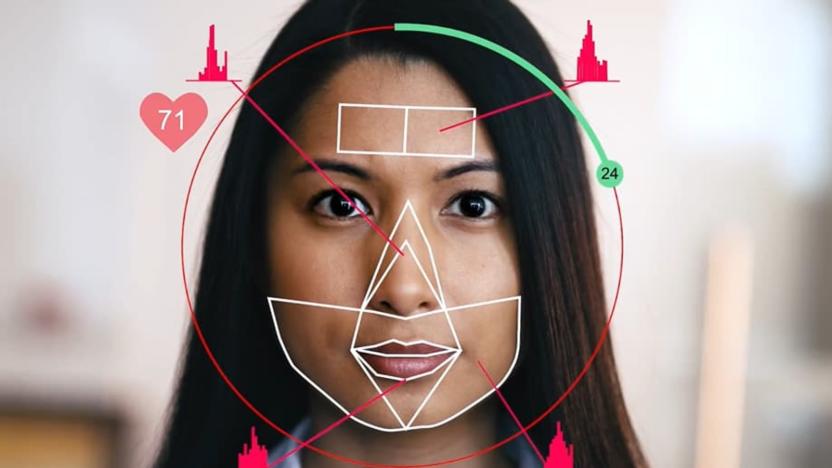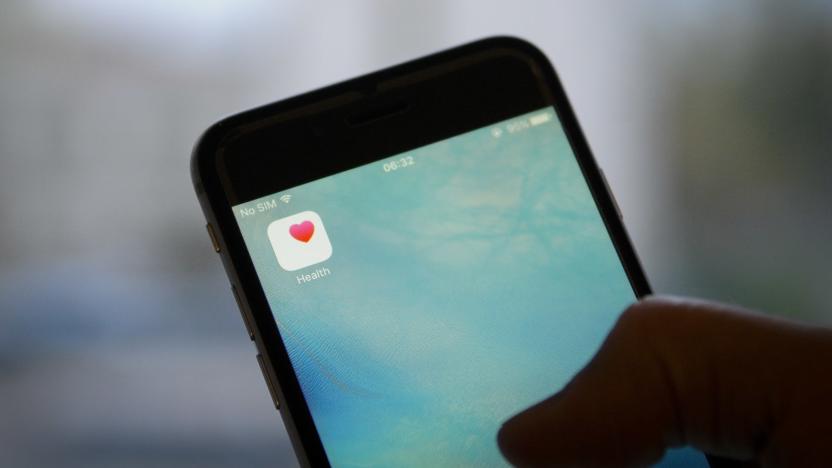health tracking
Latest

There's a new Fitbit Charge coming, based on leaked details
Fitbit users may be in for an update soon. According to UK accessory store Mobile Fun, a supplier posted details of the upcoming wearable -- which Fitbit has yet to announce -- but has since taken them down. To be clear, the listed features are anything but definite. That said, the Fitbit Charge 4 may not address the main gripe Engadget had with the Charge 3 -- a lack of onboard GPS.

Researchers find way to measure blood pressure with a selfie video
In the near future, you might not have to traipse to your doctor or pharmacy to determine your blood pressure. Researchers have figured out a way to accurately measure it with your phone's camera.

Apple reportedly buys asthma-monitoring startup
Apple has snapped up a company called Tueo Health, which was working on an app to help parents monitor asthma symptoms of their sleeping kids, according to CNBC. The startup's CEO and chief operating officer switched their employer to Apple on LinkedIn late last year, which is when the deal seems to have closed. Apple declined to comment to Engadget on the report.

Apple's secret fitness lab revealed by 'Good Morning America'
Apple just gave Good Morning America a first look at its secretive fitness lab, where it's spent the past few years putting employees through a battery of tests. And no, they didn't even know they were helping the company get ready for the Apple Watch, which packs in a bevy of sensors for health tracking. "We hooked them up with all the masks and so forth, but we would put on an Apple Watch covered up," Apple SVP of operations Jeff Williams told ABC. Still, we can't imagine Apple's workers didn't know something was up. Aside from all the sensors, and the fact that it's in a nondescript office building, the lab doesn't look that much different from your average gym -- it's packed with treadmills, fitness bikes, and rowing machines. And, most intriguingly, there are climate chambers which allow Apple to replicate a variety of different places (it also tested the Watch all over the world).

Vessyl connected cup tracks hydration and more; also makes a great gift
Those of us who are watching our waistlines often pay detailed attention to what we see on our plates, but not to what we drink. Hydration (or lack thereof) is also a key part of staying healthy, but iPhone apps to date have usually focused on how many glasses of water you think you've consumed during a day. Vessyl (pre-order, US$99) is an amazing piece of technology that has will not only tell you exactly how much you're drinking, but can detect what you're guzzling and calculate caloric input from that information and display it in an iOS app. Vessyl is the brainchild of Mark One, a startup that hopes to create other products to "inspire you to make healthier choices in real time." Vessyl was designed by frog alumni and founder of Fuseproject Yves Béhar, who is also the chief creative officer of Jawbone. Vessyl looks like a standard 13 ounce tumbler. The exterior body of Vessyl comes in three colors, with a choice of eight colors for the spill-proof lid. There's a subtle display on the outside of the glass that tells you what's inside. Built into the inside of Vessyl are sophisticated sensors that communicate data to the iOS app on your iPhone. Launch the app, and you can see how your liquid consumption during the day has progressed. Not only do you see what quantity you've consumed, but what you've been drinking by type of beverage and brand. The built-in sensors "analyze the content at the molecular level", so it knows whether you've poured a New Belgium Fat Tire Ale or a Starbucks Mocha Frappucino into the container. If the beverage has caffeine, sugar, or caloric value, it can tell you exactly how much of each item you have ingested. Let's say that caffeine is important to you - you need some to keep you awake in the morning, but you don't want jitters later in the day or sleeplessness at night. You can view a "lens" or focused app display that can tell you exactly how many milligrams of caffeine have passed your lips. Tracking calories? You'll find out just how many calories are in that nutritious smoothie you're gulping. Need to watch your sugar intake? Vessyl lets you know if you're getting a little too much sweetness for your own good. All the tracking is done automatically. Vessyl runs for about 5 - 7 days on a single charge, and charging is done through a wire-free charger in about an hour. 2015 promises to be the year that the wearables market gets rocked with the introduction of the Apple Watch, which will - among other things - track activity. Vessyl adds more pieces of critical data to the connected self. At this point, you can pre-order a Vessyl for $99; while you won't have a connected cup under the Christmas tree, it's still a great gift idea.

Sound Off! What fitness apps keep you healthy?
Now that Apple has resolved issues with Healthkit, a ton of new apps are starting to support it. Fitness tracking and health monitoring are becoming huge features that device makers want to take advantage of, and even Google is getting into the game with its own initiative called Google Fit. Are you using a combination of swanky hardware and smooth looking apps to stay in shape? Head over to the Engadget forums and share your favorite health tracking apps.

Cue measures vitamin D and fertility, brings lab testing to your home
Wearables like FitBit and the Jawbone UP have encouraged our love of personal statistics, but they're currently limited to steps taken, distance walked and a handful of other relatively simple metrics. And while some gadgets can monitor your heart rate, what about things like inflammation and vitamin D levels? Enter Cue, a 3-inch device that specializes in measuring these and several other stats, including testosterone levels and influenza. It's available for a special pre-order price of $149 starting today, and it's expected to ship in spring 2015 under the FDA's investigational devices exemption. That's a long way away, but as someone who hates the doctor's office, I'm intrigued by the idea of bringing lab tests into the home. Jump past the break for a closer look.

Basis unveils web dashboard for Basis Band health tracker, makes it easy to see how unhealthy you are
The Basis Band is a health tracking watch with optical sensors that track your heart rate, an accelerometer to see how active you are, galvanic skin response to measure your perspiration, plus ambient and skin temperature sensors. All that data gets run through a few Basis algorithms to create a picture of your health that's displayed in the handy-dandy web portal you see above. The dashboard is meant to make your data digestible so you can create (and meet) your health goals, and there's both game mechanics and social media integration to keep you motivated. Of course, you can access the raw data if you're into tracking pulse rates and perspiration levels. We got a chance to speak with company CEO Jeff Holove about Basis, and he said it's meant to enable the every man to track his health during regular daily activities -- as opposed to similar products from Garmin and Polar that are aimed at athletes. If that sounds good to you, the Basis Band comes out in "early 2012" for $199, and the cloud service will be free for those who buy in. PR and a video are after the break.






